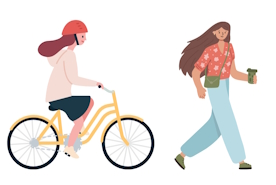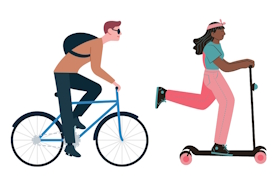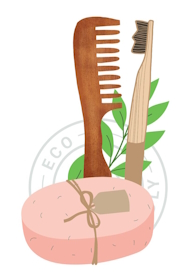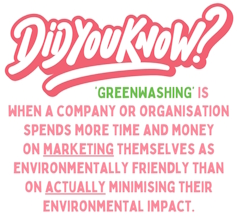By now we all know the climate crisis is in full swing, and there are plenty of facts, figures, and statistics to prove it.
Nearly every aspect of our lives affects the planet negatively, and usually it’s in the name of convenience. A matter less considered, however, is the impact we have on the environment when we decide to go on holiday. We’ve tried to simplify what you should consider if you want to have a wicked time abroad and do your bit for the planet.
Before you go
When you’re travelling responsibly it’s very important to do your research. Start by looking for countries, towns, cities, and areas that promote greener practices - you’ll usually find that there’s a governing body in charge with criteria dedicated to doing their bit and reducing local/global impact. You’ve also got a few other options when it comes to choosing a more sustainable destination:
 Visit during the off-season
Visit during the off-season
For the sake of the local economy, it’s useful to remember that the ‘peak season’ is more often than not decided by when families can take their children away - so namely, the school holidays. Workers abroad often have seasonal contracts, especially in places of high tourism, so by visiting during the off-season you can help to support a community which might suffer for the rest of the year.
Do some ‘second-city’ travelling
'Second-city’ travelling basically means bearing in mind the entire area you’re going to, not just the hotspots and photo ops. Consider staying in the next town or city over, spend a day or two exploring outside the boundaries, and get to know lesser-known destinations. Too many people in too small-a-space drains its resources, to do your bit to give the locals a chance to breathe!
Go where you’re needed
Volunteer in relief programmes, reparation projects, and at struggling sanctuaries. Once confirming it’s safe to go, you can have a huge impact in rejuvenating communities and contributing to areas whose livelihood have been affected by natural disasters, war, deforestation, and other truly hard-hitting events. It’s about looking after the economy and keeping the neighbourhood afloat.
How to get there
Now it’s sometimes quite unrealistic to consider avoiding flying, especially if you’re quite literally crossing the world. But it’s worth knowing that air travel actually makes up 20% of the tourist industry’s total emissions.
One way to contribute to reducing this problem is to fly with an airline who are actively invested in cleaner, greener fuel options - biofuel reduces carbon emissions by up to 80%! When you're picking out a flight, there's more to think about than just the price. A large chunk of a plane's pollution – up to half – comes from just taking off and landing, especially if it's a shorter trip. That's why non-stop flights are considerably better for the planet. For example: on a straight 1,800km flight, about 13% of the fuel goes into things like taxiing and getting up in the air. Throw in a layover, and suddenly 26% of fuel is being burned - and when a Boeing 747 uses 4 litres of fuel a second, that’s roughly 7,488 litres on taking off and landing alone. So, when it comes down to it, spending a few extra quid on a direct flight is a small price to pay for being kinder to our planet. Plus, let's be real, skipping layovers is a nice bonus!
Travelling by train, bus, or even car, then becomes a much more viable climate-conscious option. If you’re on holiday and thinking about renting a car or planning a road trip, definitely consider a hybrid or electric car which isn’t too big for your means - like carpooling, the more people you share with, the lower your carbon footprint. For solo trips, use a car-sharing website or use the ‘carpool’ feature on popular taxi apps - do your bit for sustainability, and make some friends along the way!
Remember:
- Trains are one of the most eco-friendly ways to travel.
They emit up to 75% less carbon emissions, they’re more economical when it comes to space and energy use, and they connect you directly to the heart of things. They’re also a bit more of an adventure, and can take you through scenery you might never experience, as well as give you the chance to catch up on Eastenders or finish your book.
- Boats are worse than planes.
You know those shocking statistics about the amount of fuel used by planes? Well, multiply that x4 and you’re closer to the levels of CO2 pumped out by cruise liners. It’s more convenient because you don’t have to book individual flights to each of the destinations, but at what cost? If you’re truly trying to reduce your carbon footprint, a Mediterranean cruise isn’t the way to do it.
- Walk, cycle, or scoot.
Keep it simple, keep it clean, keep it green. Leave the smallest footprint by using your own.



What to pack
8 million tons of plastic end up in our oceans every year, which is equivalent to 525,600 full bin lorries (1 a minute)!
Travelling more eco-friendly is all about reducing waste, and it's easier than you think! Begin by going for tough, long-lasting luggage with a decent warranty, and when you absolutely can’t get any more out of it, take it to a luggage recycling spot. Better still, make it hand-luggage only. You’ll save weight on the plane (meaning less of a carbon footprint), avoid queues at the airport, and move straight past baggage claim - there are very few downsides!
And if you're packing light, you’ll need to pay a bit more attention to what you’re packing. Consider a ‘capsule wardrobe’ with a few key items of clothing you can mix, match, and multi-use - pyjama shorts on the beach? Why not?
Here's a quick guide to swapping out some other common travel items for greener alternatives:

A water bottle and/or coffee cup
We’re pretty sure everyone has one or both of these by now. The key is to remember you’ve got them and use them! Plenty of airports have public water dispensers now, and if you can’t find one just ask in a café or restaurant - they’re usually happy to help. Similarly, say you’ve got a reusable mug or flask before you order your hot drink, so the shop assistant is well aware of your intentions.
A tote bag
You’ve definitely got one of these at home which came free with a big shop or you picked up at a job fair. If you don’t, opt for one made of sustainable, organic cotton. Fold it up small, pop it in your bag or your pocket, and you can proudly pack up your purchases knowing you’ve reduced the amount of plastic being pumped into the ocean.
Reusable foodware
It’s kind of like having a bottle-opener on your keys. You’ve got a little bundle of cutlery and a reusable straw, wrapped in a cloth napkin. Use them before a weird-tasting wooden option, and waaay before the plastic version. If you often don’t finish your food while you’re out, or plan to take lunch with you when you travel, a small lunchbox-style container might also be a good shout.
Eco-toiletries
- Soap bars or solid shampoos and conditioners, instead of ‘handy’ little plastic bottles.
- A bamboo toothbrush, instead of a plastic one.
- Toothpaste in a metal tube or powder form, instead of a plastic tube.
- Make-up in little tins or jars, instead of plastic pots or bottles.
- Make-up remover pads or a flannel, instead of plastic packets of make-up wipes.
- Solid deodorant in refillable containers, instead of aerosols or plastic rollerballs.
- Bamboo combs or brushes with natural fibres, instead of plastic hairbrushes.
We think you know where we’re going with this...

An e-reader or tablet
Save space, save weight, save paper, save the trees. As much as we hate to admit it, an e-reader is a much more eco-friendly way to approach reading.
Where to stay
Don’t overlook the impact your accommodation can have on the planet. Tourist lodgings contribute to 20% of all emissions in the tourism industry, so it’s important to understand the alternatives which are available.
Eco-conscious travellers need to look specifically for sustainable options, and luckily enough there are now specialist websites which cater to these requirements. They give you access to hotels, b&bs, huts, camping, hostels, or house-swaps who are interested in carbon-neutral and zero-waste practices for a greener experience. Before booking, you can ask about sustainable initiatives, such as recycling programs, solar power, energy-efficient lighting, or rainwater harvesting. Your accommodation choice actually plays a vital role in minimising environmental impact, so make your decision wisely!

If you’re staying in a hotel, your behaviour counts towards keeping things eco-friendly. Skip the laundry service for short stays and reuse your towels just like you would at home - hang them up if they're still good, and only leave them out to be washed if they're really dirty. We all know how much water and energy is used by a washing machine.
Be mindful of the local resources, especially in areas where they're already stretched thin, like South Africa. Save energy by turning off lights and electronics when you’re not using them, opt for quick showers, and hand-wash your clothes. Use the 'Do Not Disturb' sign to cut down on unnecessary cleaning, and set the thermostat sensibly, turning it off when you're out. Every small step can make a huge difference.
What to do
We want to talk about ‘slow travel’. It’s all about really immersing yourself in the local vibes, community, and culture, putting less strain on your environment, and moving away from fast-paced, see-it-all tourism.
You’ll leave a much smaller carbon footprint by spending your holiday doing two or three things you’re really interested in, rather than rushing through everything you think you should be interested in.

It’s also about giving back to the communities you visit - remember, you’re a guest in someone else’s home. Follow the local rules, be mindful of littering, and leave the places as beautiful as you found them. A big part of responsible travel is also to keep your money local. Amazingly, almost 90% of tourism spendings don’t end up in the local community, and instead find their way into the pockets of big global companies. So keep it small and shop authentically, eat at locally-owned restaurants, and as a general rule for life, be kind and respectful to whoever you come across. Consider if you actually need to buy souvenirs as well - does Auntie Kathy need another beaded bracelet with her name on it? Don’t contribute to the world’s waste problem if you don’t have to.
If you did fancy taking part in a tourist excursion, double-check who you’re booking with. Many companies will greenwash you into spending your money on their services, but if they’re not transparent about their eco-practices it’s probably worth doing some more research. And finally, one more tiny tip: don’t collect brochures and maps willy-nilly! Even if you need one, keep it in good condition and return it to the pile once you’re done with it.
So, the next time you travel, will you make an effort towards making it eco-friendly, sustainable, and climate-conscious?
BY HOLLY GARWOOD, 7TH MAY 2024



 Visit during the off-season
Visit during the off-season










 If you’re staying in a hotel, your behaviour counts towards keeping things eco-friendly. Skip the laundry service for short stays and reuse your towels just like you would at home - hang them up if they're still good, and only leave them out to be washed if they're really dirty. We all know how much water and energy is used by a washing machine.
If you’re staying in a hotel, your behaviour counts towards keeping things eco-friendly. Skip the laundry service for short stays and reuse your towels just like you would at home - hang them up if they're still good, and only leave them out to be washed if they're really dirty. We all know how much water and energy is used by a washing machine.  It’s also about giving back to the communities you visit - remember, you’re a guest in someone else’s home. Follow the local rules, be mindful of littering, and leave the places as beautiful as you found them. A big part of responsible travel is also to keep your money local. Amazingly, almost 90% of tourism spendings don’t end up in the local community, and instead find their way into the pockets of big global companies. So keep it small and shop authentically, eat at locally-owned restaurants, and as a general rule for life, be kind and respectful to whoever you come across. Consider if you actually need to buy souvenirs as well - does Auntie Kathy need another beaded bracelet with her name on it? Don’t contribute to the world’s waste problem if you don’t have to.
It’s also about giving back to the communities you visit - remember, you’re a guest in someone else’s home. Follow the local rules, be mindful of littering, and leave the places as beautiful as you found them. A big part of responsible travel is also to keep your money local. Amazingly, almost 90% of tourism spendings don’t end up in the local community, and instead find their way into the pockets of big global companies. So keep it small and shop authentically, eat at locally-owned restaurants, and as a general rule for life, be kind and respectful to whoever you come across. Consider if you actually need to buy souvenirs as well - does Auntie Kathy need another beaded bracelet with her name on it? Don’t contribute to the world’s waste problem if you don’t have to.